Two new browser extensions that help with delivery or access - ebsco passport and GetFTR browser extension and other developments
One of the earliest themes of this blog was to track tools that not only helped with discovery but also with delivery, helping users to gain access to full-text via institution subscriptions (and of course via Open Access) even if they did not start off the library homepage.
Solving this access or delivery issue had many solutions (I even wrote a whole Library Technology Report on this, or see this blog post) but one of the methods that took off the fastest was providing access via Browser extensions (which was dubbed as Access Brokers by RA21/SeamlessAccess)
Here is some past coverage for context on such browser extensions
In this post, we are going to update the state of play of this area by covering
Major changes to existing players particularly Lean Library and Libkey Nomad
Cover briefly the new Ebscohost Passport browser extension
Cover briefly the new beta GetFTR browser extension
Major changes to the two main existing players - Lean Library and Libkey Nomad
It is interesting to revisit the installation numbers of the various access broker browser extensions. As of Aug 2023, these are the numbers from the Chrome Store.
Google Scholar button - 3,000,000+ users (free)
EndNote Click - Formerly Kopernio - 2,000,000+ users (free)
Libkey Nomad - 600,000+ users
Lean Library - 200,000+ users
Lazy Scholar - 10,000+ users (free)
OA helper - 3,000+ users (free)
Library Extension - 2,000,000+ users (free)- this one unlike the other focuses only on books.
These six extensions (with the 7th focusing on books) help you find not only free to read papers but also ones behind paywall that you can access via institutional subscriptions.
There are more of course, but these six are the most established and fully featured ones. We also exclude extensions that provide illegal access, typically via sci-hub
Of course, there are other extensions that focus only on free to read articles including Unpaywall (600,000+ users) , Open Access Button (40,000+ users) and lesser known ones like CORE Discovery (5,000+ users), OA.mg (30,000+ users) , PaperPanda(100,000+ users) and more.
In terms of the six extensions above, the free Google Scholar button remains top with three million users which is not surprising.
Kopernio which was one of the pioneers of this space, is now owned by Clarivate, who have integrated and renamed Kopernio to Endnote Click with their Endnote product. Following the footsteps of Kopernio, Endnote Click is free to use, but like most of its competitors it works better if libraries work with them to set up connections to aggregator content via institutional link resolvers.
For institutions that are Web of Science customers, librarian can offer access to Endnote Click Premium, which gives users a 2 GB locker space and Dropbox integration.
Evolution of Third Iron Libkey Nomad & Sage's Lean Library
Google Scholar button and EndNote Click - Formerly Kopernio have huge installation numbers basically because they are free and work well without much library support.
However, academic libraries of today mostly pay for and publicize their support for either
a) Third Iron's Libkey Nomad or b) Sage's Lean Library, and these two tools have developed and evolved the fastest.
Lean Library which was eventually acquired by Sage, was one of the first access broker browser extensions to go beyond simply support of access.
As of Aug 2023, the solution is broken into three main modules
Lean Library Access - which covers the traditional functions of an access broker extension. But even then, it allows librarians to add customizable popup messages as users visit particular domains or even URLs, supporting communication and marketing tasks.
Lean Library Workflow for Libguides- An add-on to the Lean Library Access , this allows you to integrate LibGuides content into the extension
Lean Library Futures - This provides even more Intergrations, including integrations with discovery services such as Primo , Summon, EDS, support for user feedback of resources (NetPromoter Score), content intergration (hot linking text in Wikipedia with links to Sage Research Methods, Statista etc), chatbot intergation and more
Meanwhile Third Iron's Libkey Nomad continued to evolve as well. The browser extension which launched in 2019, basically added retraction signal posting via Retraction Watch Database data, ingested OA data from Unpaywall.This eventually lead to ThirdIron hosting information of Unpaywall and OA availability data themselves locally so libraries could collectively report and correct incorrect OA availabilty information.
It is fair to say that up to 2023 compared to Lean Library, Libkey Nomad even the Libkey Suite (that includes Libkey Discovery, Libkey Link and Libkey.io) focused mainly on delivery or providing access to things users wanted without going out to helping with the discovery aspect.
There was one exception, support of linking to ebooks. This was a feature long available in Lean Library (with varying degree of comprehensiveness) and Libkey finally did the same with LibKey Nomad E-Books Linking, first supporting Alma libraries in March 2023.
Also in 2023, Third Iron launched a new product - LibKey Nomad++. It added the "domain intelligent messaging and custom linking, LibChat integration,, integration with popular bibliographic management tools, and options to customize and brand the extension"
Some of it like domain intelligent messaging and custom linking, LibChat Integration look very similar to existing features in Lean Library and seems to signal Third Iron moving away from just focusing on linking to content but to allow other types of library intergration.....
Ebscohost Passport
This is a new free browser plugin from Ebsco launched in June 2023 that aims to
makes research simpler and more efficient for end users by dynamically inserting links to full text in virtually any webpage where the DOIs are present.
How is this done?
Ebscohost passport checks to see if the user has access to linked articles either in an EBSCOhost full text database, through a subscribed journal at the publisher site or through open access sources. It even honours the authentication preferences of the user's institution and adjusts the links accordingly.
This sounds very similar to what Libkey Nomad does of course.
Below shows the extension in action on Google Scholar
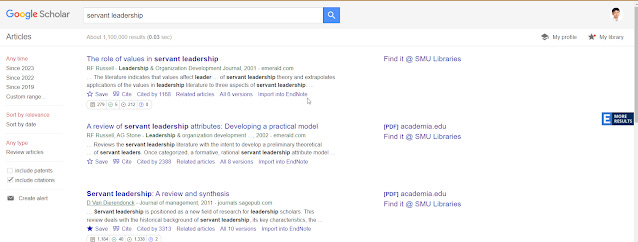
Below shows the extension in action in Wikipedia references.
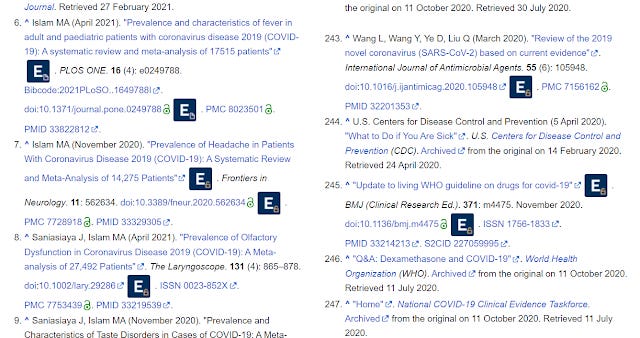
There are three main type of icons you will see.
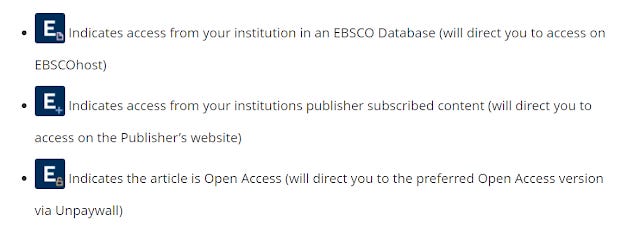
Firstly, you will see an icon that indicates you have access from your institution via a subscribed EBSCO Database.
Secondly, you may see an icon that indicates you have access from other publisher subscribed content via your institution.
Lastly, you may see an icon that indicates you have access via Open Access copy (found via paywall).
All this seems fine and dandy but how does this browser extension know what your institution has? According to this article, "the access to subscribed content only works for libraries using EBSCO's Holdings Management tool".
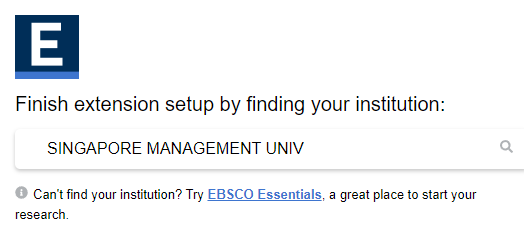
Quick tests using my institution find that this is true. For my institution, it works okay if the content is in one of our subscribed databases on ebscohost but it does not seem to know about holdings on other platforms.
This fits, given that while we used to once have EDS (Ebsco discovery services), we have since moved to Alma/Primo and no longer have our holdings in the Ebsco systems. But presumably Ebsco still knows what Ebsco databases we have and the holding in those.
GetFTR plugin
GetFTR is something I have written about in the past for example here and here but here's a perhaps overly simplified way of explaining it is as follows.
If you look at the various solutions whether Libkey Nomad, Lean Library or even link resolvers in general, the library either needs to maintain a listing of holdings or provide that to third parties like Third Iron (for Libkey) , Sage (for Lean Library) for the system to work.
GetFTR turns this on it's head, and instead the publisher/content owners maintain the list of holdings.
Roughly speaking the GetFTR workflow involves
1. System authenticates to confirm which institution you are from (technically this can happen later as well)
2. System then determines from the DOI which publisher has that article and queries that publisher asking if the user's institution allows access to the article
3. The publisher (which hopefully supports GetFTR) will respond with a yes/no and a link to the full-text
4. Profit!
The issue here is for the whole GetFTR to get off the ground at step 1, it needs to be done on a discovery platform that supports GetFTR and currently there are not that many of those (e.g. One platform that supports GetFTR checks is ResearchGate, also Dimensions & Papers).
One way around the problem is to install the GetFTR browser extension that will act as a GetFTR enabled platform to do the checks as you browse across the web!
This is a very new beta browser extension made available June 2023, so this is a preliminary look!
Installing the browser plugin will get you the usual popup asking you to add your institution. I was half expecting my institution not to appear on the list because we do not do federated access generally for access to electronic resources and I understand while GetFTR in theory can work with any authentication method, they are most closely associated with using Seamless Access.
Instead, I noticed all the Singapore institutions do appear, even ones that don't do OpenAthens etc.
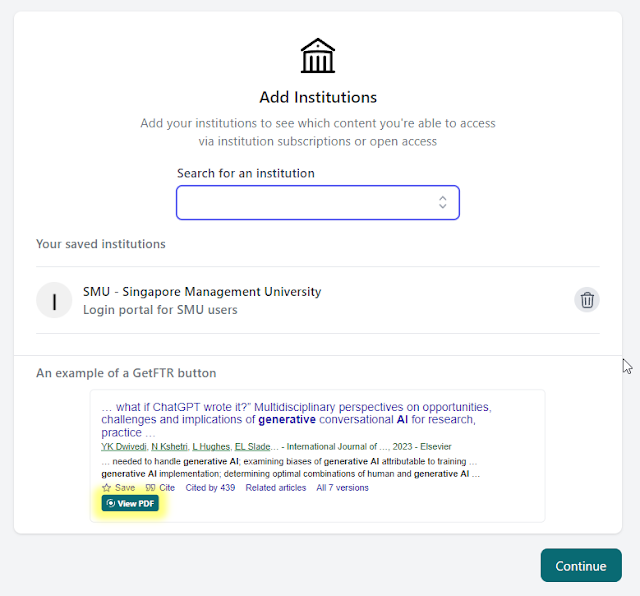
But what are the platforms supported for this browser extension where they will activate and display a GetFTR button?
Currently, they support seven sites including the popular Google Scholar and PubMed. They also work on Two popular academic discovery services - Summon and EDS (but not Primo it seems), Web of Science and the lesser known Lens.org
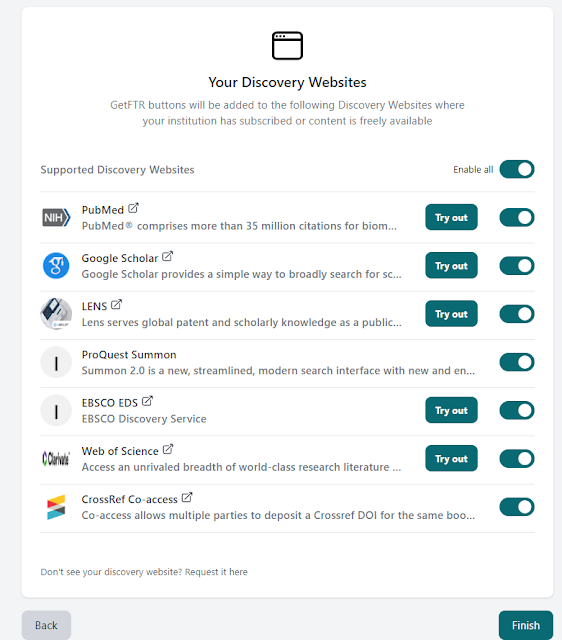
Lastly, there is an interesting CrossRef Co-access. The website says
Co-access allows members to register multiple records and DOIs for the same book content item. This option is provided to support members who publish book content on multiple platforms
Fascinating, yet another wrinkle this time relating to registering dois for book content that I was unaware of. It's unclear to me how often this done in practice.
What type of buttons will the GetFTR browser extension produce?
All buttons produced I believe will have the same icon and label "View PDF", however mousing over the button you may see
"full-text is open access"
"full-text available through - <institution>"
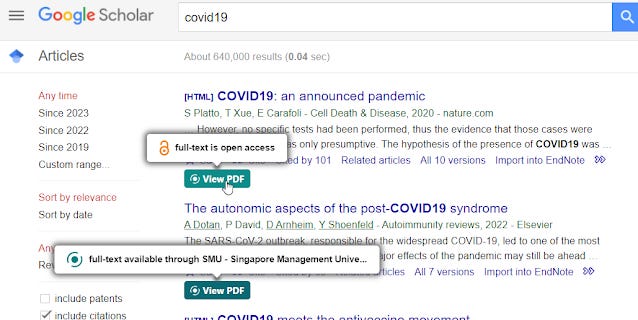
There is a third label - "full-text is freely available". I am not quite sure how this differs from the "full-text is open access", except maybe one is temporarily made available via the content owner.
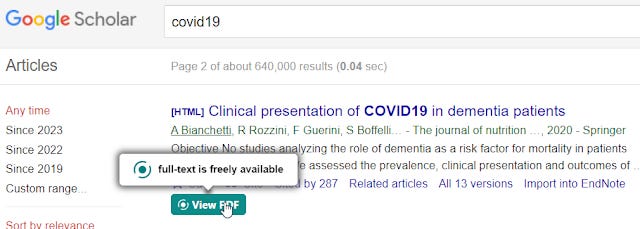
Playing around with my institution, I get mostly buttons on content from Elsevier which was one of the earliest supporters of GetFTR.
Interestingly there were some buttons that stated "full-text available through - Singapore Management University" which indicated that it was in theory capable of bringing users to content behind paywall even for us.
But when I clicked on the button , I was not asked to authenticate but most were not behind paywall anyway. No doubt this was something to do with our setup (or lack there of).
Conclusion
Looks like there is still some life in this area! Particularly curious to see how GetFTR browser extension develops. Also makes me wonder if some of the existing browser extensions like Libkey Nomad or Lean Library might bring in GetFTR technology as an additional/secondary way to check for access.

